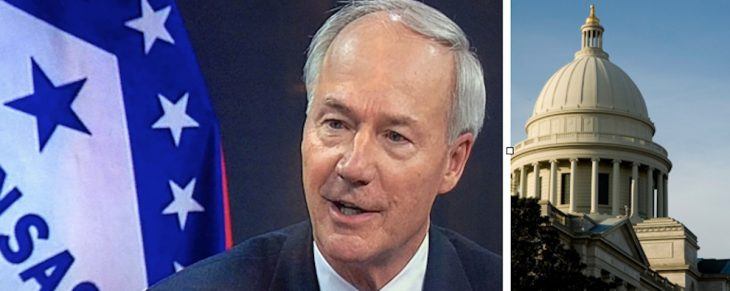Governor plans to decline $89 million in federal rental help funds
by April 22, 2022 5:15 pm 1,449 views

Gov. Asa Hutchinson said Friday (April 22) that he will seek to decline roughly $89 million in federal rental assistance funds.
In other business, he said the Department of Finance and Administration has officially determined the state will have a $1 billion surplus by June 30. That’s up from the previous estimate of $600 million.
During one of his periodic “Pen and Pad” press conferences at the state Capitol, the governor presented a letter he is sending to Treasury Secretary Janet Yellen declaring Arkansas will not accept all of its $146 million in the second phase of Emergency Rental Assistance funds (ERA2) contained in the American Rescue Plan Act of 2021.
Instead, Arkansas is requesting 39% of that amount, or about $57 million.
The letter requested confirmation that the state can use those funds to support programs that provide rental assistance combined with housing stability efforts including job training and drug addiction remediation.
“My intention is for Arkansas to draw down no more than 39% of the available funding and direct it towards these programs,” the letter said. “If you cannot confirm that we may implement only these programs without offering rental assistance separate and apart from housing stability services, we will not draw down any funds.”
The letter said Arkansas has closed its application portal for emergency rental assistance and does not plan to reopen it. The governor said in the press conference that Arkansas already has $20 million in unspent housing stability funds. Direct rental assistance program funds have been expended, and the $20 million cannot go to rent without permission from the Treasury Department, said Department of Human Services Deputy Director Keesa Smith.
The letter said the state is operating a pilot program using unspent ERA1 funds with the nonprofit groups Our House and Restore Hope. It said the two groups have a proven record of helping families that are homeless or at risk of being homeless. Additional ERA2 funds would continue that pilot program and expand it to other nonprofits.
The governor said in the press conference the money he is declining would create a new, continuing program whose funds would be distributed only to tenants and not also to landlords.
“Our economy has returned, there’s jobs aplenty out there, and we have existing programs in place for rental assistance that were pre-pandemic,” he said.
He said he would speak later that day to Gene Sperling, White House American Rescue Plan coordinator and senior advisor to the president, in hopes of gaining greater flexibility for using the funds. He said Nebraska is the only other state that is not accepting all the money available to it.
“This money, I wish it could go back to the treasury, but it actually, it will be recouped and sent elsewhere where there’s greater needs,” he said. “And to me, that’s a responsible management of the taxpayers’ dollars.”
Arkansas Advocates for Children and Families Executive Director Rich Huddleston criticized Hutchinson’s actions in a statement released afterwards.
“Tens of thousands of Arkansas households are either behind on rent or aren’t confident in their ability to make next month’s payment,” he said. “Thousands that have applied for assistance have been denied. Instead of refusing to put money in the pockets of Arkansan families in need, we should be making it easier for families to stay in their homes and make ends meet.”
Elsewhere in the press conference, Hutchinson said the $1 billion surplus could be used to expand broadband deployment throughout the state, for school facilities that are dealing with inflating school construction costs, or for tax relief.
He said no decision has been made and that he will be discussing the issue with legislators. The earliest a special session might occur would be mid-to-late summer, but he would prefer not to have one. In addition to the surplus, the call of a special session would depend on how the U.S. Supreme Court rules in a Mississippi abortion case that could alter or overturn the Roe v. Wade court decision that legalized abortion nationwide, he said.
Hutchinson also referenced a report released this week by the Broadband Development Group, a consultant, that showed the state would need up to $550 million to provide broadband internet services to reach 110,000 households not currently served by other federal programs.
Another 100,000 households do not have broadband services but are in line to be covered by other federal programs. Under federal rules, the cost of covering those households cannot be supplemented by a state program that’s funded by federal dollars.
Hutchinson said he will be traveling to various states over the next three to four months, including New Hampshire next week. He said each stop will have an economic benefit, but, because he will be engaged in other activities, the trips will be financed by his political action committee, America Strong and Free.
The governor has said in the past that he is considering running for president. New Hampshire is the first state to hold party primary elections each cycle.
